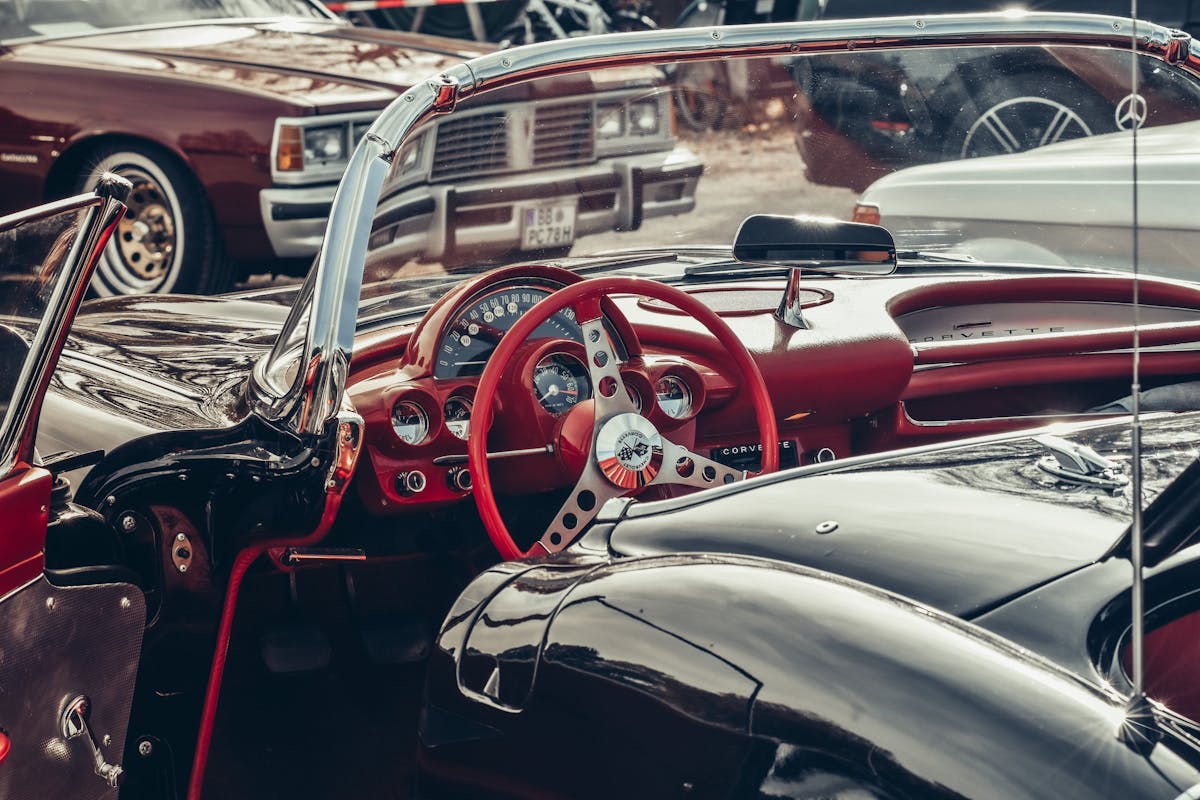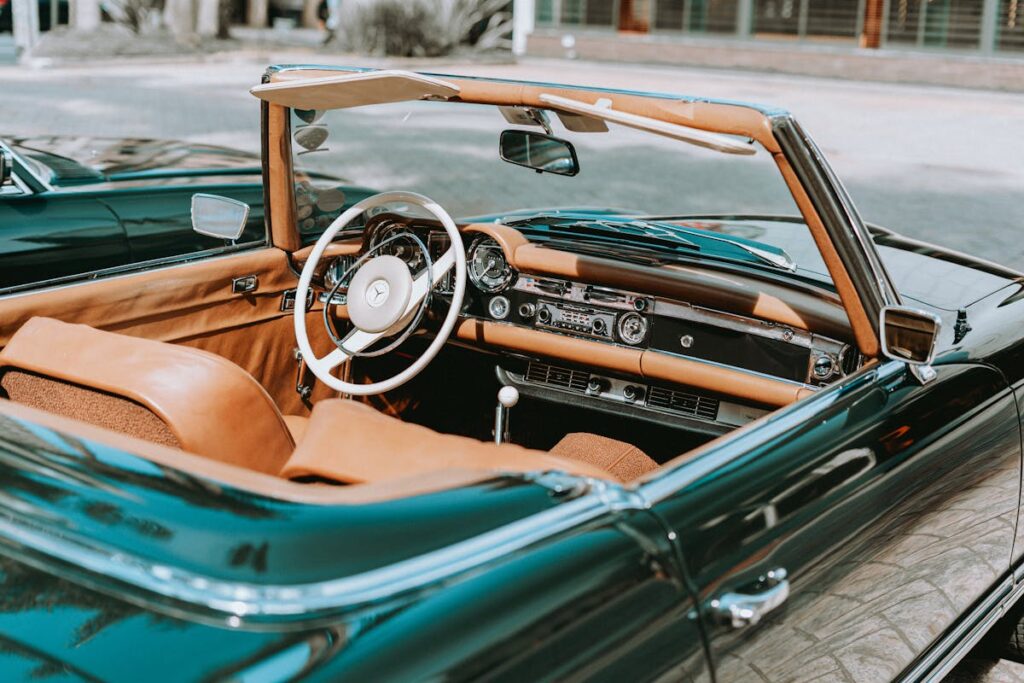The initiation into the world of classic car collecting is both exhilarating and complex, requiring a blend of financial savvy, diligent research, and discerning taste. It is a pursuit that extends beyond mere acquisition, encompassing the preservation of automotive heritage and personal passion alike. Whether you’re driven by nostalgia, investment potential, or the sheer beauty of these vintage machines, understanding the fundamentals is essential. However, the intriguing question remains: How does one navigate the nuanced path of establishing a valuable and satisfying classic car collection?
Understanding Classic Cars
In the domain of automotive enthusiasts, classic cars hold a special allure, a unique charm that transcends generations. They are not merely vehicles; they are symbols of engineering prowess and design aesthetics of yesteryears. Immersing oneself in classic car history can be likened to taking a journey back in time, where the essence of past eras is encapsulated in the form of these beautiful machines.
Understanding classic cars goes beyond their aesthetic appeal. It requires an in-depth exploration into the annals of automotive innovation, tracing the evolution of iconic models that have shaped the industry. From the Ford Model T, the trailblazer of mass production, to the elegant and luxurious Rolls-Royce Phantom, each classic car has a unique story to tell.
Knowledge of these iconic models and their significance in the overall classic car history is crucial. This understanding helps in appreciating not just their monetary value, but also the historical and cultural value they embody. Consequently, the journey to start a classic car collection is as much about passion and appreciation of art as it is about investment.
Setting Your Budget
In the world of classic car collection, one cannot overlook the vital step of budgeting. Understanding your financial capacity is the cornerstone to a successful collection, allowing you to strategize purchases without compromising financial stability. Planning for collection expenses, including acquisition, maintenance, storage, and potential restoration costs, will further guarantee your journey into classic car collection is both enjoyable and sustainable.
Determining Financial Capacity
Delving into the world of classic car collection requires a clear and realistic understanding of your financial capacity. This is not a hobby for the faint-hearted or financially unprepared, as it demands significant monetary commitment. Your budget plays a critical role in shaping your collection and therefore, needs careful evaluation.
Consider your investment potential – how much can you afford to invest in acquiring, maintaining, and insuring these vintage beauties? These vehicles are not just modes of transportation, they are investments. Their value appreciates over time, especially if well-preserved and cared for.
Insurance considerations are also paramount. Classic cars require specialized insurance due to their unique value. This often costs more than standard auto insurance. Evaluate the potential costs and factor them into your overall budget.
Additionally, you need to account for unexpected expenses. Classic cars can require costly repairs or restorations, so it’s prudent to have a contingency fund.
Planning Collection Expenses
Mapping out the financial landscape of your soon-to-be classic car collection is a fundamental step. This endeavor goes beyond the initial purchase price of each car. A thorough budget includes maintenance costs, storage fees, and the often-overlooked insurance options.
Insurance for classic cars is a specialized field. Extensive coverage is essential to protect your investment from unforeseen circumstances such as theft, accidents, or fire. Many insurance providers offer plans designed specifically for classic cars, often with agreed-upon values that may exceed typical book values. Researching insurance options and incorporating them into your budget is a key part of planning your collection expenses.
Further, consider the resale value of each classic car in your collection. While you may be collecting for passion rather than profit, understanding the potential future value of each vehicle is important. The classic car market can be volatile, and certain models may appreciate greatly over time.
Researching Classic Car Models
Initiating the journey of classic car collection necessitates an extensive exploration into the world of vintage car models. This quest involves more than just browsing pictures and memorizing specifications, it entails understanding each vehicle’s unique narrative, its historical significance, and the allure that makes it a coveted collectible.
Some iconic models, like the 1963 Chevrolet Corvette Sting Ray or the 1969 Ford Mustang Mach 1, have both vintage features and a rich history that make them irresistible to collectors. These models are not just about horsepower or engine specifications, but also about the legacy they carry and the era they represent. They are snapshots of automotive history, embodying the design philosophies, technological innovations, and cultural influences of their time.
It’s essential to study the models in-depth, perusing their original brochures, owner’s manuals, and period reviews. Investigate their production numbers, rarity, and the details that affect their value such as factory options, colors, and trim levels.
Paying careful attention to these details will not only refine your taste but also make you a more informed, discerning collector. Your passion will be fueled by knowledge, transforming you from a vintage car enthusiast into a dedicated, savvy collector.
Finding the Right Dealerships
The search for the perfect classic car invariably leads us to the doorstep of dealerships. Identifying and researching reputable dealers is a critical process, as it largely determines the authenticity and value of your potential acquisition. Additionally, mastering the art of negotiating car prices can enhance your investment and make the journey of building your collection an exhilarating experience.
Researching Reputable Dealers
While the allure of classic cars can be intoxicating, it’s imperative to approach the acquisition process with diligence and discernment, particularly when selecting a dealer. The search for a reputable dealer involves research and patience. Dealerships with a strong history in the classic car market are often the safest bet, offering expertise and authenticity in their vehicle offerings.
Online resources can be a potent tool in gauging a dealer’s reputation. Customer reviews and feedback can be found on various platforms, offering insights into the dealer’s reliability, honesty, and quality of service. Look for dealerships with positive reviews and ratings, but also pay attention to how they handle any negative feedback.
Community forums are another excellent platform for research. They are often filled with passionate classic car enthusiasts who share their experiences, recommendations, and warnings. Their firsthand accounts can be invaluable in identifying trustworthy dealers.
Assess the dealer’s inventory. Are the vehicles well-maintained and accurately represented? A reputable dealer will be transparent about a vehicle’s history and condition.
In essence, researching reputable dealers involves leveraging online resources, listening to the classic car community, and evaluating the dealer’s inventory with a critical eye. This groundwork will pave the way to a rewarding classic car collecting journey.
Negotiating Car Prices
Driving a hard bargain is an essential aspect of building a classic car collection, especially when it comes to finding the right dealerships. This process is not just about haggling, it’s about understanding the market, being aware of price trends, and employing effective negotiation tactics.
Classic car prices fluctuate according to various factors such as the car’s condition, rarity, and historical significance. As a result, being knowledgeable about price trends is critical. Monitor the market, use resources like classic car pricing guides, and follow auctions to understand the car’s value better.
Negotiation tactics are equally important. Be assertive, yet respectful. An informed buyer who knows the market value of the car is in a strong position to negotiate. Don’t be afraid to walk away if the price doesn’t match your valuation. Expressing your willingness to walk away can prompt the dealer to reconsider their pricing.
Inspecting Before Purchasing
Passion for classic cars often begins with admiration, but true appreciation must extend to the intricate details that define their worth. Therefore, a thorough inspection before purchasing is paramount. A detailed pre-purchase checklist is a necessity for any collector, and should include a mechanical evaluation as a top priority.
A mechanical evaluation is a detailed examination of the car’s engine, transmission, brakes, suspension, and overall structural integrity. It is essential to scrutinize the health and function of these components as they directly impact the car’s performance and value. Whether you’re a seasoned collector or a novice enthusiast, this is where your investment can either flourish or flounder.
The pre-purchase checklist should also extend to the exterior and interior of the car. From the alignment of the body panels to the condition of the upholstery, every detail matters. Consider engaging a professional inspector to guarantee nothing is overlooked.
Classic Car Restoration Tips
Every single detail counts when it comes to classic car restoration. This process is one of art, skill, and patience, requiring a keen eye and a deep understanding of the vehicle’s history and character. Your passion for classic cars should be mirrored in your restoration techniques, reflecting the original beauty and design of the car while taking advantage of modern advancements.
- Research: Pour over the make, model, and year of your classic car. Learn about the vintage parts that are unique to it, and source these carefully to maintain authenticity.
- Plan: Create a detailed restoration plan. This should include a timeline, budget, and a list of necessary parts and services. Staying organized will streamline the process and prevent overspending.
- Execute: Implement your plan with precision. Engage skilled professionals for complex tasks, and be prepared to invest significant time into the project. Remember, quality restoration is a labor of love, not a race.
These tips provide a roadmap to successful classic car restoration. With diligent research, careful planning, and precise execution, you can honor the heritage of your car while infusing it with new life and longevity.

Proper Storage and Maintenance
Upon perfecting the restoration of your classic car, the journey doesn’t end there. It’s essential to emphasize the importance of proper storage and meticulous maintenance. These elements are the lifeblood that guarantees the longevity of your automotive masterpiece, preserving the value, appearance, and performance of your classic car.
Climate control plays a significant role in maintaining your car’s pristine condition. A stable and controlled environment protects the vehicle from damaging fluctuations in temperature and humidity, which can lead to rust, corrosion, and other detrimental effects.
Vehicle security is paramount to your collection’s protection. Whether it’s advanced alarm systems or secure, locked storage, taking these steps safeguards your investment from theft or vandalism.
Preservation techniques, such as using breathable car covers and adding fuel stabilizers, can further prolong the life of your vehicle. Routine inspections are also essential, allowing you to detect and address minor issues before they escalate into costly and damaging situations.
Expanding Your Collection
Building on the foundation of your initial classic car purchase, the expansion of your collection requires strategic planning and discerning judgment. It is not merely about acquiring as many vehicles as possible but rather, it’s about selecting the right cars that align with your passion and resonate with the collecting trends.
- Identify Your Interests: Your collection should reflect your passions. Whether it’s a fascination with a specific era, manufacturer or model, your collection will be more fulfilling if it aligns with your interests.
- Research the Market: Understanding the classic car market is crucial. Keep abreast of collecting trends and fluctuations in value. This guarantees the investment potential of your collection remains high.
- Quality over Quantity: Choose cars based on their condition, rarity, and pedigree. A well-maintained, rare model with an illustrious history will always hold more value than several mediocre vehicles.
Frequently Asked Questions
Is It Necessary to Have Mechanical Knowledge to Start a Classic Car Collection?
While not absolutely necessary, possessing mechanical skills can greatly enhance your classic car collection experience. Understanding restoration techniques will also enable you to maintain and improve your vehicles, adding to their value and appeal.
Can Classic Cars Be Used for Daily Commuting or Long Road Trips?
While classic cars can add a unique touch to daily commuting or road trips, their daily reliability and road trip readiness may be compromised due to age-related wear and tear or outdated technology.
Are Classic Cars a Good Investment in Comparison to Modern Cars?
Classic cars can be a good investment due to appreciation trends, but it’s dependent on market fluctuations. Unlike modern cars, classics may increase in value over time if maintained properly, offering potential financial advantages.
How Does One Deal With Spare Parts Availability for Classic Cars?
Dealing with spare parts availability for classic cars involves proactive sourcing from specialized suppliers, online platforms, and car shows. Understanding potential restoration challenges also aids in effectively managing part availability for these unique automotive treasures.
Do Classic Cars Require Special Insurance Coverage?
Yes, classic cars typically require special insurance coverage. Various insurance types are designed specifically for these vehicles, considering their unique value. The coverage costs might vary, depending on the car’s age and overall condition.

